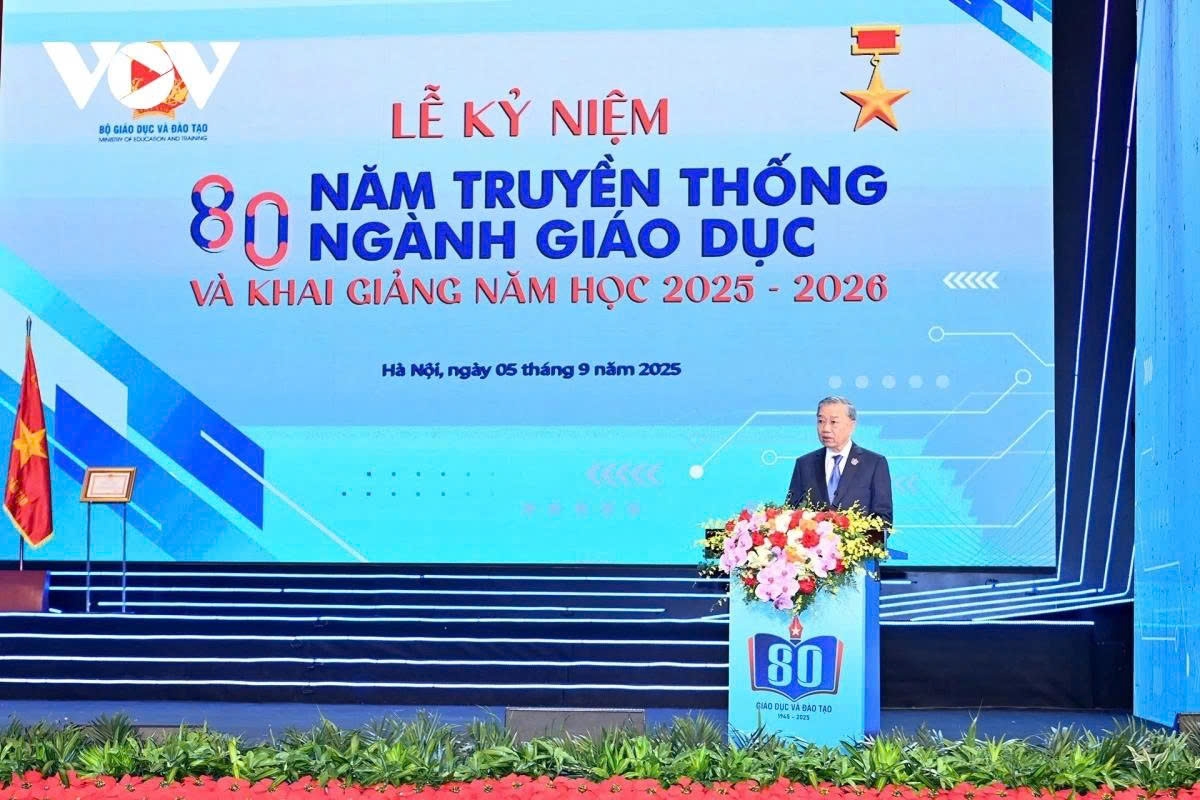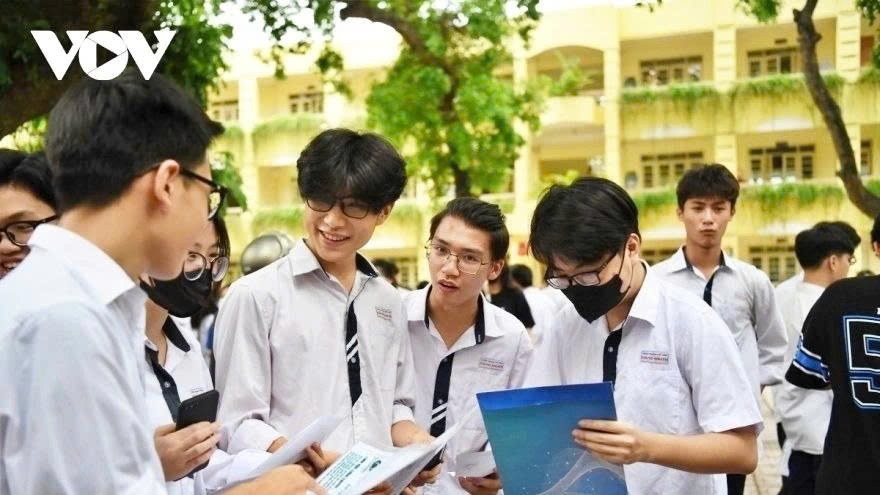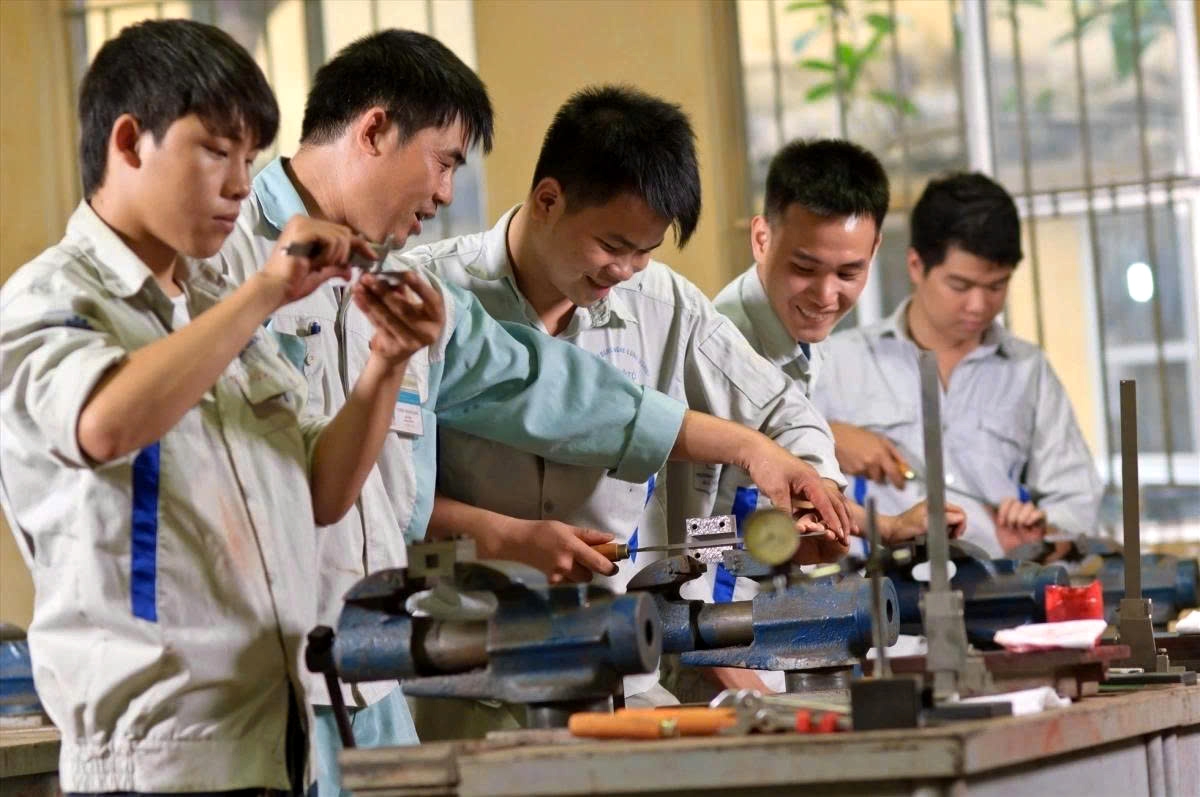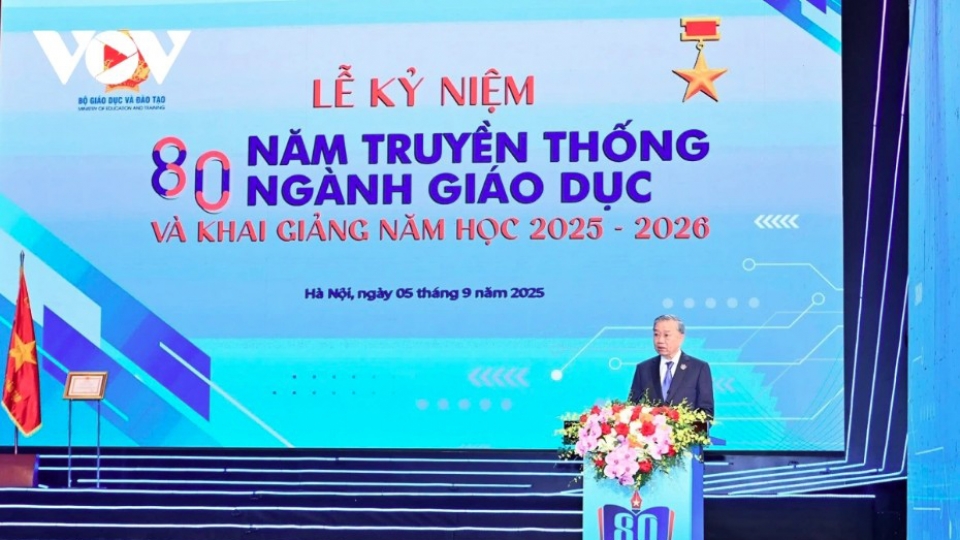Education – the decisive factor in shaping national destiny
VOV.VN - The Politburo has recently issued Resolution No. 71-NQ/TW on breakthroughs in education and training development which is considered a new revolution in the education sector, opening up a strategic vision for national development in the new era.
According to Deputy Minister of Education and Training Pham Ngoc Thuong, for the first time, the Party affirms that education is not only the top national priority but also the decisive factor for the country’s destiny.
“Previous resolutions have never clearly stated the impact of education on the country’s fate. This is a truly groundbreaking perspective, reflecting the strategic importance of education for national development,” he emphasised.

This principle was powerfully reaffirmed by Party General Secretary To Lam in his speech at the recent opening ceremony of the 2025–2026 academic year, stressing that if Vietnam wants to go fast, far, and sustainably, there is no other choice but to take education as the foundation and the key driving force.
Resolution 71 – A roadmap for transformation
Resolution 71 is structured comprehensively with 6 guiding viewpoints, 3 groups of goals across different phases (by 2030, 2035, and 2045), and 8 groups of action-oriented, breakthrough, and feasible solutions. One of its core perspectives is that educational breakthroughs must begin with innovations in mindset, perception, and institutions.
Beyond affirming the importance of education, the Resolution sets out very specific requirements. The Ministry of Education and Training is urgently working with the Party Central Committee’s Commission for Information, Education and Mass Mobilisation to organise the study and dissemination of the Resolution throughout the political system. At the same time, it is preparing to propose amendments to important laws, such as the Law on Education and the Law on Higher Education, at the coming year-end session of the National Assembly to ensure a consistent legal framework.
Notably, for the first time, the Resolution explicitly requires that the Party Committee of the National Assembly direct relevant bodies to allocate sufficient resources for implementation starting in 2025. The Government’s Party Committee is also tasked with directing ministries, sectors, and localities to select priority tasks and complete them within the 2025–2026 school year.
According to Deputy Minister Thuong, this reflects the decisive direction of the Party and State leadership, particularly the dedication and concern of General Secretary To Lam for education. He noted that this Resolution clearly identifies education as the mission of the entire Party, the people, and the whole political system, not just the education sector itself. Only when the whole society works together can education truly become the top national priority and create high-quality human resources, enabling the country to stand shoulder to shoulder with the world’s powers, as President Ho Chi Minh once aspired.
Investment in the future

At the 2025–2026 academic year opening ceremony in Hanoi, General Secretary To Lam stated said Vietnam is entering a new stage of development, with the goal of becoming a modern industrialised country by 2030 and a developed, high-income economy by 2045. In the context of globalisation, the knowledge economy, rapid advances in science and technology, and digital transformation, education and training must firmly maintain their role as the top national priority and become the key driving force of national development.
To quickly bring Resolution 71 to life, the General Secretary laid out a series of requirements. IN his opinion, the Party must boldly innovate its leadership mindset toward education, avoiding imposing outdated standards on a modern education system. The National Assembly must continue perfecting the legal system, ensuring a smooth, stable, and advanced legal framework for education reform. The Government must increase investment, guarantee financial and infrastructural resources, strengthen teaching staff, and decisively remove institutional bottlenecks to unlock and mobilise all possible social resources for education.
Notably, the education sector itself must lead in renewing teaching methods and governance, building a team of teachers with both knowledge and ethics, along with a strong sense of dedication.
“Now more than ever, we must see investment in education as investment in the future, in sustainable and powerful national development,” stressed the Party leader.
Education - key to national development
One of the major orientations outlined by the General Secretary is the shift from piecemeal reform to an innovative mindset in leading national development through education. The new education model must be evaluated by the criteria of quality, fairness, integration, and efficiency. At the same time, it must tighten discipline in implementation, ensure equal access to education, raise the overall intellectual standard, and build a highly skilled workforce.
Based on this, the education sector has been assigned major orientations, with a primary focus on bold innovations in both thinking and action, taking education as the foundation for building the country’s future.

Resolution 71 and the Party leader’s message reaffirm a fundamental truth that education is the foundation of the nation’s aspirations for prosperity and strength. It’s remembering that since the earliest days of independence, President Ho Chi Minh considered “nurturing people” as a top mission, stating that “An ignorant nation is a weak nation.”
Today, in an era of fierce global competition, a nation’s greatest resource is no longer its natural endowments but its human capital. This is why education and training must not only remain “the top national priority” in name but must truly serve as the decisive factor in determining the nation’s destiny as Resolution 71 affirms.
The year 2025 also marks the 80th anniversary of President Ho Chi Minh’s letter to students (1945–2025) and the 80th anniversary of the education sector. These milestones bring added motivation to reaffirm the determination to innovate education. More than commemorating history, this is an opportunity to solidify the national resolve to build a modern, humanistic, and globally integrated Vietnamese education system, one that elevates Vietnam and enables it to stand proudly among the world’s leading countries.
With strong political determination, the concerted efforts of the entire political system, and the active involvement of society, Vietnam’s education sector is poised to achieve historic breakthroughs, ushering in a new era of sustainable and robust national development.





